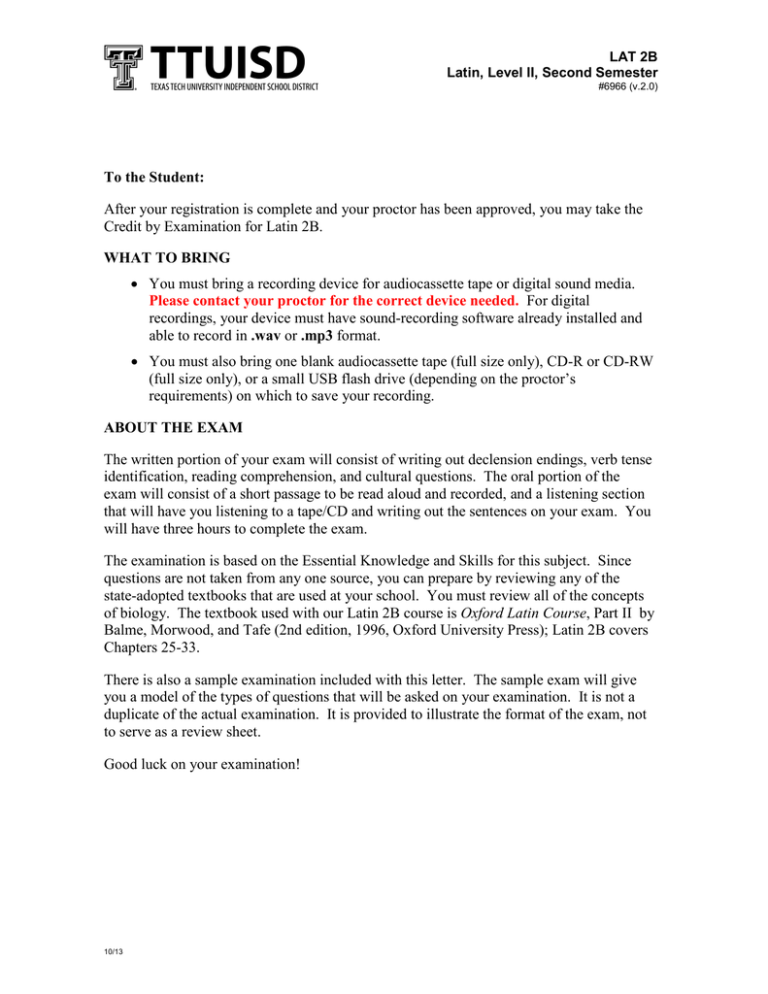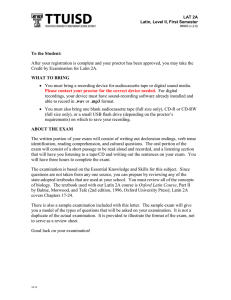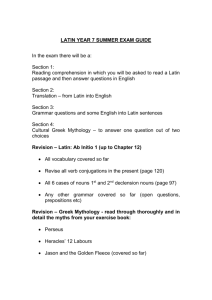After your registration is complete and your proctor has been... Credit by Examination for Latin 2B. To the Student:
advertisement

LAT 2B Latin, Level II, Second Semester #6966 (v.2.0) To the Student: After your registration is complete and your proctor has been approved, you may take the Credit by Examination for Latin 2B. WHAT TO BRING • You must bring a recording device for audiocassette tape or digital sound media. Please contact your proctor for the correct device needed. For digital recordings, your device must have sound-recording software already installed and able to record in .wav or .mp3 format. • You must also bring one blank audiocassette tape (full size only), CD-R or CD-RW (full size only), or a small USB flash drive (depending on the proctor’s requirements) on which to save your recording. ABOUT THE EXAM The written portion of your exam will consist of writing out declension endings, verb tense identification, reading comprehension, and cultural questions. The oral portion of the exam will consist of a short passage to be read aloud and recorded, and a listening section that will have you listening to a tape/CD and writing out the sentences on your exam. You will have three hours to complete the exam. The examination is based on the Essential Knowledge and Skills for this subject. Since questions are not taken from any one source, you can prepare by reviewing any of the state-adopted textbooks that are used at your school. You must review all of the concepts of biology. The textbook used with our Latin 2B course is Oxford Latin Course, Part II by Balme, Morwood, and Tafe (2nd edition, 1996, Oxford University Press); Latin 2B covers Chapters 25-33. There is also a sample examination included with this letter. The sample exam will give you a model of the types of questions that will be asked on your examination. It is not a duplicate of the actual examination. It is provided to illustrate the format of the exam, not to serve as a review sheet. Good luck on your examination! 10/13 Latin 2B CBE Review To help you prepare for the Latin 2B CBE exam, I want to go over the essential concepts that you are expected to know to be able to show proficiency in the first semester of a second-year Latin course. Whether you have taken Latin in a classroom or have taught yourself, you need to study the designated grammar for the exam that I am giving you in this review. Additional help can be found in any Latin textbook and online (type “Latin grammar” into any search engine). Pronouns: You are expected to know all the relative pronoun cases and their uses. Verbs: You are expected to know the future endings of the 1st and 2nd conjugations and the 3rd and 4th conjugations. Remember, they are not the same. You will be expected to know the active and passive voices for all tenses: present, imperfect, future, perfect, pluperfect, and future perfect. You will also be expected to know how to form the present participle. Adjectives/Adverbs: You will be expected to know the comparative and superlative forms of adjectives and adverbs. Reading Comprehension: You will be expected to read a passage in Latin and answer questions over the passage. This will test your workable knowledge of grammar and vocabulary. Culture: To do well on the cultural section, have a basic knowledge of the members of the First and Second Triumvirate, the assassination of Caesar, and the events that immediately followed it. Oral: You will be asked to record yourself reading a passage, so practice reading aloud. (See “What to Bring” on the first page of this document for instructions about recording media.) 2 Practice Exam Study all the recommended grammar and then take this practice exam. It follows the same pattern as the real exam, but it is shorter. If you want to get full benefit out of this practice, do it first without using a textbook or any other aids; then check your answers, identify any problem areas, study more, and try it again. Part I Give the comparative and the superlative of the following adjectives. 1. celer ___________________________________________________________________ 2. pulcher _________________________________________________________________ Part II Translate the following into Latin. 1. he has been prepared ______________________________________________________ 2. I will have been prepared ___________________________________________________ 3. we had been prepared ______________________________________________________ Part III Give the following relative pronouns in Latin. 1. who (sing., masculine) _____________________________________________________ 2. whose (sing.) ____________________________________________________________ 3. to whom (sing.) __________________________________________________________ continued → 3 Part IV Answer the questions following this passage. Quintus ubi domum redit patrem invenit res componentem. ille “age, Quinte,” inquit; “noli cessare; sine mora ad portum ibimus navemque quaremus quae ad Graeciam te feret. nolo diutius in urbe manere; melius est statim discedere.” 1. What did Quintus find when he returned home? ________________________________________________________________________ 2. Where should they go without delay? ________________________________________________________________________ 3. What should they look for there? ________________________________________________________________________ 4. What is it better to do? ________________________________________________________________________ Part V Answer the following cultural questions. 1. Name the members of the First Triumvirate. ________________________________________________________________________ 2. Who said, “Et tu, Brute?” ________________________________________________________________________ 3. When was Julius Caesar assassinated? ________________________________________________________________________ 4. Who was Octavian? ________________________________________________________________________ 4 Answer Key for Practice Exam Part I Part IV 1. celerior celerrimus 1. his father composing a letter 2. pulchrior pulcherrimus 2. the port 3. a ship to take Quintus to Greece 4. to leave the city immediately Part II 1. paratus est 2. paratus ero Part V 3. parati eramus 1. Caesar, Pompey, Crassus 2. Julius Caesar 3. Ides of March, 44 B.C. Part III 1. qui 4. great nephew and adopted son of Julius Caesar 2. cuius 3. cui 5 Texas Essential Knowledge and Skills Languages Other Than English (High School) §114.21. Implementation of Texas Essential Knowledge and Skills for Languages Other Than English, High School. The provisions of this subchapter shall supersede §75.62(a)-(g) and (k)-(o) of this title (relating to Other Languages) beginning September 1, 1998. (a) General requirements. (1) Levels I and II - Novice progress checkpoint can be offered in elementary, middle, or high school. At the high school level, students are awarded one unit of credit per level for successful completion of the level. (2) Using age-appropriate activities, students develop the ability to perform the tasks of the novice language learner. The novice language learner, when dealing with familiar topics, should: (A) understand short utterances when listening and respond orally with learned material; (B) produce learned words, phrases, and sentences when speaking and writing; (C) detect main ideas in familiar material when listening and reading; (D) make lists, copy accurately, and write from dictation; (E) recognize the importance in communication to know about the culture; and (F) recognize the importance of acquiring accuracy of expression by knowing the components of language, including grammar. (3) Students of classical languages use the skills of listening, speaking, and writing to reinforce the skill of reading. (b) Introduction. (1) Acquiring another language incorporates communication skills such as listening, speaking, reading, writing, viewing, and showing. Students develop these communication skills by using knowledge of the language, including grammar, and culture, communication and learning strategies, technology, and content from other subject areas to socialize, to acquire and provide information, to express feelings and opinions, and to get others to adopt a course of action. While knowledge of other cultures, connections to other disciplines, comparisons between languages and cultures, and community interaction all contribute to and enhance the communicative language learning experience, communication skills are the primary focus of language acquisition. (2) Students of languages other than English gain the knowledge to understand cultural practices (what people do) and products (what people create) and to increase their understanding of other cultures as well as to interact with members of those cultures. Through the learning of languages other than English, students obtain the tools and develop the context needed to connect with other subject areas and to use the language to acquire information and reinforce other areas of study. Students of languages other than English develop an understanding of the nature of language, including grammar, and culture and use this knowledge to compare languages and cultures and to expand insight into their own language and culture. Students enhance their personal and public lives and meet the career demands of the 21st century by using languages other than English to participate in communities in Texas, in other states, and around the world. (c) Knowledge and skills. (1) Communication. The student communicates in a language other than English using the skills of listening, speaking, reading, and writing. The student is expected to: (A) engage in oral and written exchanges of learned material to socialize and to provide and obtain information; (B) demonstrate understanding of simple, clearly spoken, and written language such as simple stories, high-frequency commands, and brief instructions when dealing with familiar topics; and (C) present information using familiar words, phrases, and sentences to listeners and readers. (2) Cultures. The student gains knowledge and understanding of other cultures. The student is expected to: (A) demonstrate an understanding of the practices (what people do) and how they are related to the perspectives (how people perceive things) of the cultures studied; and (B) demonstrate an understanding of the products (what people create) and how they are related to the perspectives (how people perceive things) of the cultures studied. (3) Connections. The student uses the language to make connections with other subject areas and to acquire information. The student is expected to: (A) use resources (that may include technology) in the language and cultures being studied to gain access to information; and (B) use the language to obtain, reinforce, or expand knowledge of other subject areas. 6 (4) Comparisons. The student develops insight into the nature of language and culture by comparing the student's own language and culture to another. The student is expected to: (A) demonstrate an understanding of the nature of language through comparisons of the student's own language and the language studied; (B) demonstrate an understanding of the concept of culture through comparisons of the student's own culture and the cultures studied; and (C) demonstrate an understanding of the influence of one language and culture on another. (5) Communities. The student participates in communities at home and around the world by using languages other than English. The student is expected to: (A) use the language both within and beyond the school setting through activities such as participating in cultural events and using technology to communicate; and (B) show evidence of becoming a lifelong learner by using the language for personal enrichment and career development. Source: The provisions of this §114.22 adopted to be effective September 1, 1998, 22 TexReg 4930. 7





